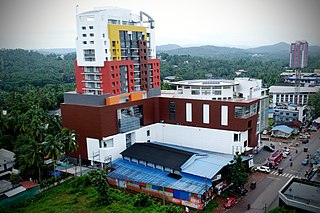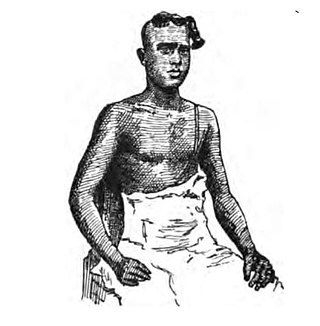
Elamkulam Manakkal Sankaran Namboodiripad, popularly known by his initials 'E. M. S.' was an Indian communist politician and theorist, who served as the first Chief Minister of Kerala in 1957–1959 and then again in 1967–1969. As a member of the Communist Party of India (CPI), he became the first non-Congress Chief Minister in the Indian republic. In 1964, he led a faction of the CPI that broke away to form the Communist Party of India (Marxist).

Malappuram, is one of the 14 districts in the Indian state of Kerala, with a coastline of 70 km (43 mi). It is the most populous district of Kerala, which is home to around 13% of the total population of the state. The district was formed on 16 June 1969, spanning an area of about 3,554 km2 (1,372 sq mi). It is the third-largest district of Kerala by area, as well as the largest district in the state, bounded by Western Ghats and Arabian Sea to either side. The district is divided into seven Taluks: Eranad, Kondotty, Nilambur, Perinthalmanna, Ponnani, Tirur, and Tirurangadi.

Chelat Achutha Menon was an Indian politician and lawyer who served as the 4th Chief Minister of Kerala from November 1969 to August 1970 and again from October 1970 to 1977. He is viewed as one of the most influential Chief Ministers of Kerala.
Moolayil Narayana Menon Vijayan, popularly known as Vijayan Mash was an Indian academic, orator, columnist and writer of Malayalam literature. Known for his leftist ideals and oratorical skills, Vijayan was the president of the Purogamana Kala Sahitya Sangham and served as the editor of Deshabhimani. He published a number of books of which Chithayile Velicham received the Kerala Sahitya Akademi Award for Literary Criticism in 1982.
Azhvanchery Thamprakkal or Azhvanchery Samrāṭ is the title of the senior-most male member of the Nambudiri Brahmin feudal lords of Azhvanchery Mana in Athavanad, Kerala, South India. They had the right over Guruvayur, and were the titular head of all Nambudiri Brahmins of Kerala. The Lord of Azhvanchery based at Athavanad and the Lord of Kalpakanchery based at neighbouring Kalpakanchery were usually present at the coronation of a new Zamorin of Kozhikode. Kalpakanchery Thamprakkals were related to the Nambudiris of Panniyoor while Azhvanchery Thamprakkals to those of Chowwara.

Tirur is a major town municipality in Tirur Taluk, Malappuram district, in the Indian state of Kerala, spread over an area of 16.55 square kilometres (6.39 sq mi).

The University of Calicut, also known as Calicut University, is a state-run public university headquartered at Tenhipalam in Malappuram district of the state of Kerala, India. Established in 1968, it is the first university to be set up in northern Kerala. The university is coordinated by the University Grants Commission.

Sree Kerala Varma College is a government aided college in Kanattukara, Thrissur, Kerala, India. Founded in 1947 by His Highness Aikya Keralam Thampuran, the Maharaja of erstwhile Kingdom of Cochin. Managed by the Cochin Devaswom Board, Sree Kerala Varma College is an academic institution in Kerala.

The Nambudiri, also transliterated as Nampoothiri, Nambūdiri, Namboodiri, Namboothiri and Nampūtiri, are a Malayali Brahmin caste, native to what is now the state of Kerala, India, where they constituted part of the traditional feudal elite. Headed by the Azhvanchery Thamprakkal Samrāṭ, the Nambudiris were the highest ranking caste in Kerala. They owned a large portion of the land in the region of Malabar until the Kerala Land Reforms starting in 1957, and intermarried with the Nair monarchs and aristocracy through Sambandham. This marriage relation between the Nambudiris and the Nairs formed an important aspect in the administration (Jenmi) of colonial Kerala.
Moothiringode Bhavathrāthan Namboothiripad was a Malayalam author who is known for his work Aphante Makal which had great social relevance in pre-independent Kerala society.

Vellithuruthi Thazhathu Karutha Patteri Raman Bhattathiripad (1896–1982), also known as V. T. Bhattathiripad, was an Indian social reformer, dramatist and an Indian independence activist. He was best known for his contributions in the reformation of the casteism and conservatism that existed in the Namboothiri community. He wrote a number of books which include a play, Adukkalayail Ninnu Arangathekku and his autobiography, Kanneerum Kinavum and many critics consider them as notable works in Malayalam literature. Kerala Sahitya Akademi honoured him with distinguished fellowship in 1976.
Mullamangalath Parameshwaran Bhattathiripad, commonly known as M. P. Bhatathirippad or Premji, was a social reformer, cultural leader and actor from Kerala state, India. Premji joined Yogakshema Sabha and worked with V. T. Bhattathiripad, E. M. S. Namboodiripad and his brother M. R. Bhattathiripad in the fight against the casteism and conservatism that existed in the Nambudiri community. Premji was also a noted stage and film actor who won the National Film Award for Best Actor for the film Piravi.
Mullamangalath Raman Bhattathiripad (1908–2001), also known as M. R. Bhattathiripad, was an Indian social reformer, cultural leader and a Malayalam writer.

Kottappuram or Kottapuram is a village in Kodungallur, Thrissur district, Kerala, India. Kottapuram is the southern boundary of Kodungallur. The place is named after a fort built by the Portuguese in 1523 It is also the headquarters of the Kottapuram Diocese. It is surrounded by Krishnankotta on the east, Thiruvanchikulam on the north, Gothuruth on the south and Valiya Panikkan Thuruth on the south. The main rice trade in Kodungallur is at the Kottapuram market. Historians believe that this market is as old as Sangham period. The site of the historic Portuguese fort is now under the protection of the Archaeological Survey of India. There is also a monument to Knai Thoma near the fort.
Kanippayyur Shankaran Namboodiripad (1891-1981) was a Nambudiri Brahmin in the State of Kerala in India who helped rejuvenate interest in the Indian traditional architectural styles known collectively as Vastu shastra. He was a consultant for the renovation of many temples in Kerala, Tamil Nadu and Karnataka, and also the Royal Architect for the three royal families of Travancore, Cochin and Kozhikode (Calicut). He was a prolific writer authoring more than a hundred books on a variety of books relating to traditional knowledge areas like vastu shastra (architecture), jyothisha, ayurveda, and also books on history. He compiled a Sanskrit-Malayalam Dictionary and a Dictionary of Indigenous Medicines.

Sathish Kalathil is an Indian film and documentary director and producer in Malayalam. He is also story writer, and lyricist. His experimental works are well known and appropriately discussed in Malayalam Cinema industry and his debut movie Jalachhayam (2010) was well discussed according to its experimental approach. His first film was Veenavaadanam (2008), an experimental documentary about art (painting). In 2012, he directed Laloorinu Parayanullathu, a social committed documentary film about municipal solid waste.
Arya Pallam was a social reformer, communist, feminist from Kerala who fought against the oppression of upper class (Brahman) women.

P. Chitran Namboodirippad was an Indian writer, educationist and leading social activist from Kerala. He was a National Award-winning educationist and also a mountain man who trekked in the Himalayas for the 29th time even at his age of 99. Namboodirippad was honoured by Justice P. Sathasivam, governor of Kerala on the occasion of his 99th birthday.
Religious education in Kerala was historically influenced by traditional Indian religions like Hinduism, Buddhism and Jainism through the ancient education system of Gurukula. Abrahamic religions were practiced in Kerala through the early days of maritime trade. Buddhism added educational vocabulary, including Namostu Jinatam, Ezhuthu Palli, and Pallikoodam to the Malayalam language. Madrasa institutions, coordinated by various Madarasa education boards referred to as Othupalli or Palli Dar since the independence of India. Modern Christian education began in the early 19th century.















